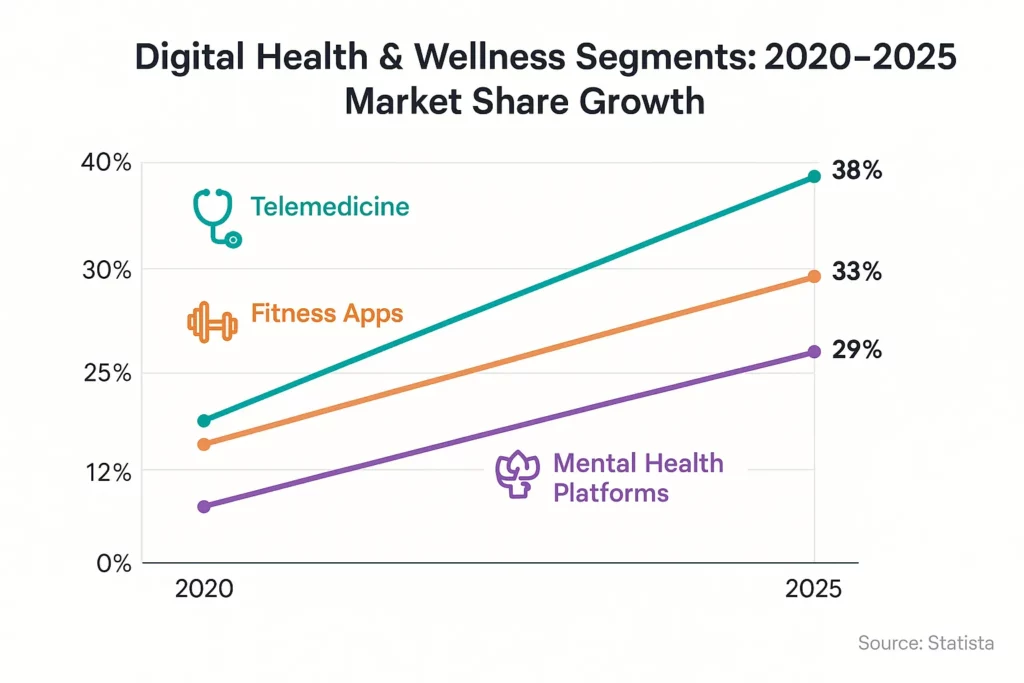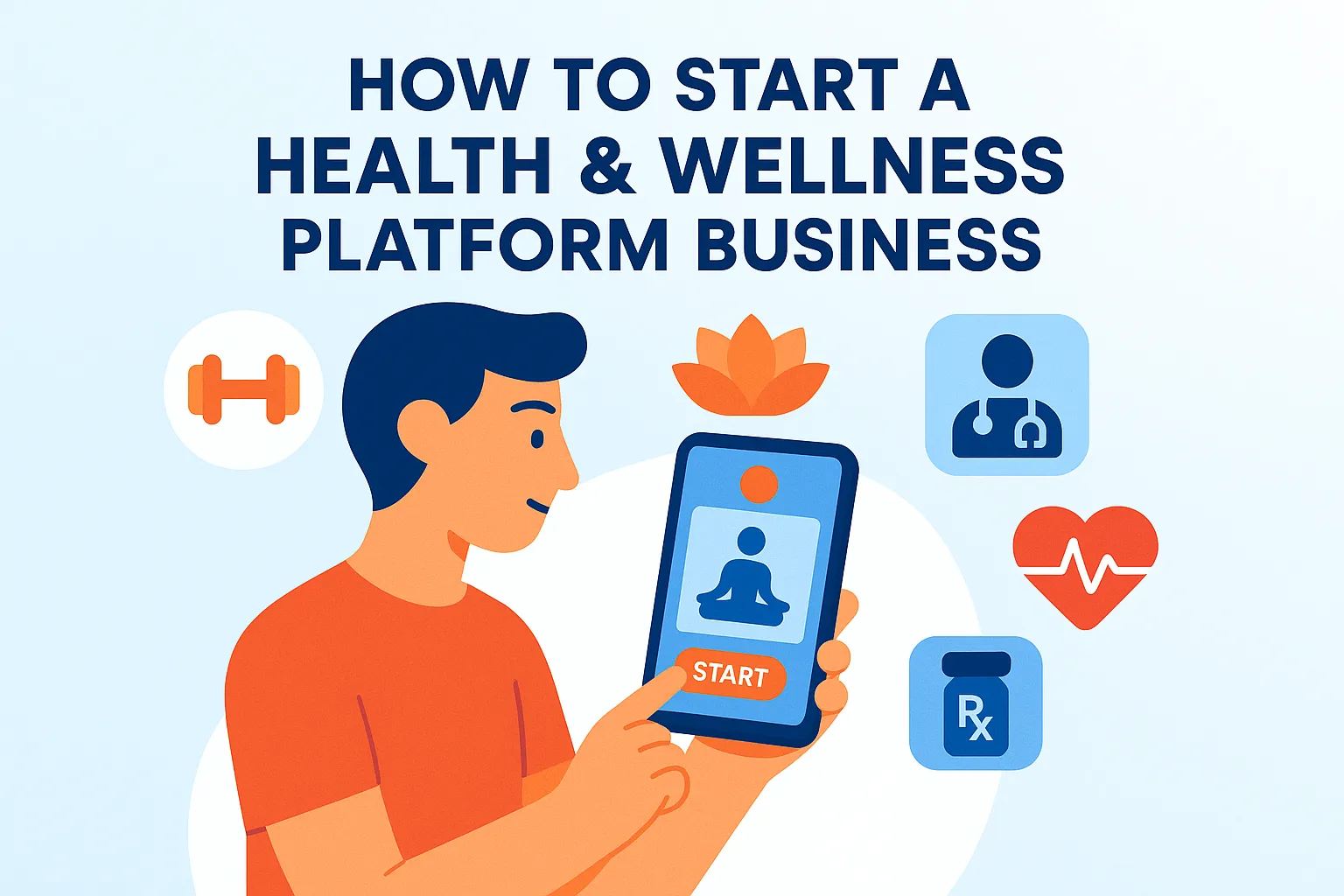Not too long ago, I found myself scrolling through a wellness app at 2 AM—searching for something, anything, to help me sleep better. It hit me then: the health & wellness industry isn’t just a trend; it’s a lifeline for millions of people navigating stress, chronic illness, or just trying to stay in shape while working remotely with three kids and a cat on the keyboard.
For entrepreneurs and creators alike, there’s never been a more promising time to jump into digital wellness. From virtual consultations and on-demand therapy to Ayurveda tracking and cannabis prescription platforms—the game has changed. The way people approach their physical and mental health is now wrapped in algorithms, push notifications, and clean UI.
And if you’re dreaming of building a health tech empire—or even just the next Practo, Lybrate, or Weedmaps clone—Miracuves can help you go from sketchpad to scalable product with real monetization muscle.
Why Health & Wellness Platforms Are Booming
The global wellness economy is projected to reach $8.5 trillion by 2027 (Statista). This surge is fueled by everything from post-COVID digital health shifts to mental health normalization on TikTok. Your audience isn’t just patients—it’s creators, lifestyle coaches, fitness junkies, dieticians, and stressed-out remote workers.
Platforms aren’t just limited to hospitals. We’re talking:
- Telemedicine apps
- Mental wellness & therapy-on-demand platforms
- Fitness & nutrition tracking apps
- Holistic medicine directories
- Cannabis consultation networks

Read more: – What is Noom App and How Does It Work?
Successful Health & Wellness Platforms (And What You Can Learn)
Let’s run through some top players and what makes them tick (without writing an essay):
1. Practo – India’s telemedicine giant
Search, consult, and order medicines in-app. Smooth UI + doctor verification + real-time appointment booking = trust and efficiency.
2. Lybrate – Q&A-style community + doctor booking
Differentiates via bite-sized health advice and public Q&A from real doctors. Great retention model!
3. Zocdoc – U.S. based appointment scheduler
It’s basically OpenTable for doctors. Smooth UX, calendar sync, and insurance filters—very patient-first.
4. Headspace & Calm – Mental health meets mindfulness
Not medical, but crucial. Guided meditation, sleep aids, and emotional regulation—subscriptions galore.
5. Weedmaps – Medical cannabis delivery & doctor locator
Hyper-local + regulatory navigation + product info = niche domination. Think of it as Swiggy for certified cannabis.
6. MyFitnessPal – Fitness meets food tracking
Calorie tracking, step counts, barcode scanning—habit-forming features that encourage long-term stickiness.
Read more: – What is a 1mg App and How Does It Work?
Must-Have Features for a Health & Wellness App
Whether you’re building a Practo Clone or something brand new, your MVP should pack these punches:
Profile & Verification
- User + Practitioner onboarding
- KYC, license uploads, or health ID sync
Appointment Scheduling
- Real-time availability, reminders, cancellations
- Bonus: calendar integrations (Google, iCal)
In-App Chat & Video
- HIPAA-compliant messaging & consultations
- Add AI-based symptom checker for delight!
Payment & Insurance Integration
- Stripe/Razorpay for direct pay
- Insurance code verification = bonus trust
e-Prescriptions & Records
- Store medical history, share prescriptions securely
- Easy export in PDF/email
Geo-tagging & Local Directory
- Location-based doctor listings, pharmacies, cannabis clinics, etc.
Business Models That Actually Make Money
Don’t just chase installs—chase revenue. Here’s how the big players do it:
- Commission Model (Practo, Zocdoc): % cut per consultation
- Freemium Model (Headspace, Calm): free content + paid upgrades
- Ad-Based (Weedmaps): dispensaries & clinics pay for listings
- Subscription Model (MyFitnessPal Premium): access to advanced tools
- Lead Gen + SaaS for Practitioners: CRM tools, booking widgets, etc.
Read more: – What is a Netmeds App and How Does It Work?
Steps to Launch Your Own Health Platform
1. Find Your Niche
Mental wellness? Ayurveda? Fitness coaching for seniors? Hyper-niche = easier user traction.
2. Validate the Demand
Run surveys, test ads, or even a basic landing page. Build before you code.
3. Choose the Right Tech Stack
Scalability, security (HIPAA/GDPR), and speed are non-negotiables. Flutter + Node + MongoDB = common trio.
4. Design a Seamless UX
Your users are stressed. Don’t add to it. Think Calm meets Zocdoc.
5. Go Lean with a Clone
Instead of burning $50K+ on ground-up dev, consider launching with a tailored clone of Practo, Headspace, etc.
Why Miracuves?
At Miracuves, we understand that launching a health or wellness platform isn’t just about writing code—it’s about creating trust. Whether you’re building a Practo Clone, a meditation app like Calm, or a directory like Weedmaps, we bring years of clone tech expertise to help you go live faster, safer, and smarter.
Conclusion
Health isn’t just a personal priority anymore—it’s a thriving digital frontier. Entrepreneurs who seize this moment can build meaningful, profitable platforms that change lives and shape habits.
Whether it’s streamlining online doctor consultations or curating mindful self-care experiences, you don’t need to reinvent the wheel—just launch smarter.Miracuves is here to fast-track your vision with ready-to-customize app clones that are robust, user-friendly, and built to grow. Want to lead the next big wave in wellness tech? Let’s build it—together.
FAQs
Q1. How much does it cost to build a wellness app like Practo or Headspace?
You can build a wellness app like Practo or Headspace with Miracuves for $2K to $5K using a ready-made clone solution, delivered within 3–6 days including setup and deployment.
Q2. Is HIPAA compliance mandatory?
If you’re dealing with medical data in the U.S. (or similar regions), yes. Miracuves apps can be built with full compliance.
Q3. an I include AI in my app?
Absolutely! Symptom checkers, health bots, or even AI-driven mental health support are all possible.
Q4. What’s the best way to monetize a wellness platform?
Subscriptions, ads, and commissions are most common. Choose based on your niche and target users.
Q5. Do I need a medical background to launch?
No, but having certified professionals on board is crucial for credibility and safety
Q6. How quickly can I launch?
With Miracuves’ clone solutions, you can go live in 4–6 weeks, not months.
Related Articals:
- How to Start a Health & Wellness Platform Business
- Most Profitable Healthcare and Telemedicine Apps to Launch in 2025
- How to Develop Online Pharmacy & Healthcare App
- Most Profitable Healthcare and Telemedicine Apps to Launch in 2025
- How to Start an Online Pharmacy & Medicine Delivery Platform Business








